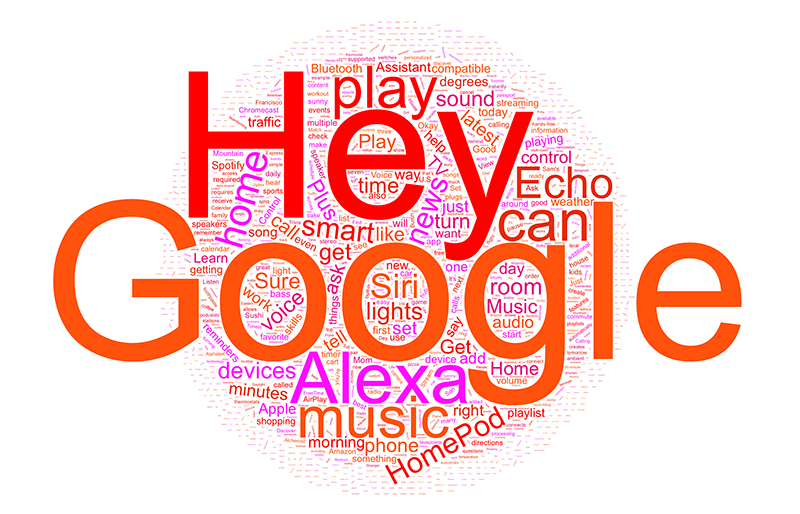
Text from all three smart speaker websites as a word cloud
Amazon, Google, and Apple promise that each of their smart speakers will do what you want and get what you need. Easy to use, with an AI assistant ready to do as you wish—in essence, your own Westley inside a speaker. Even though they have different names, AI assistants, and appearances, smart speaker websites look similar—or in some places, use the same language—and it’s no accident. The speakers perform in similar ways, so why not use similar language to advertise them. Meet The Most Overused Words in Smart Speaker Advertising.
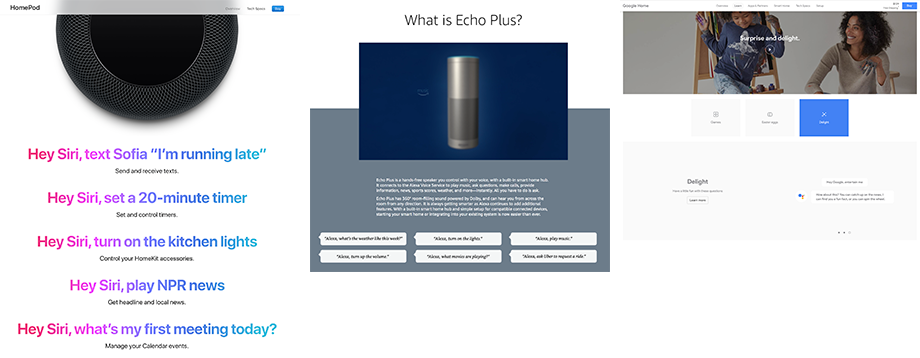
Website captures: HomePod, Echo Plus, Google Home
Looking at each product’s website, the similarities become evident. The layouts are structured the same, broken down into small chunks of text, with plenty of instances of “Alexa” or “Hey Google” or “Hey Siri.” Appearances of “Hey Google” (150) dwarf all of the other advertising copy at the Google Home website, with “Alexa” (59) and “Hey Siri” (17) used much less.
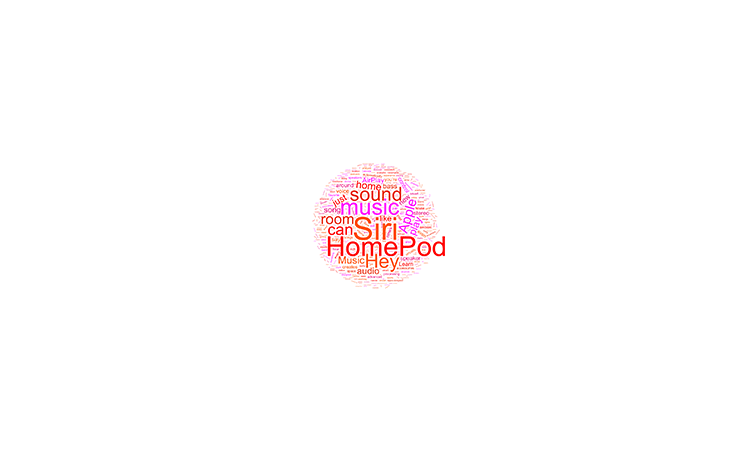
Word clouds for HomePod, Echo Plus, Google Home—the larger the word, the more frequently its use on the product’s website.
In all cases, the AI assistant makes up a majority of the advertising copy. Not only does this promote Alexa, Google, or Siri but it also teaches (potential) customers how easy it is to get what they want when they want it with an appropriate turn of phrase. But looking closer at each website, certain features are more prevalent than others. Apple puts the most emphasis on how HomePod—”a breakthrough speaker”—offers excellent audio quality. So it’s no surprise that “music” appears on Apple’s site 29 times in all. Echo Plus includes 21 uses of “music” with Google Home using it 11 times. Apple features the word “sound” more than its competition (17 times), including but not limited to “nuanced sound that defies its size” and “precision sound that fills the room” and “to give you optimal sound.” With Apple’s HomePod, the big idea—as advertising legend David Ogilvy discusses in his book Ogilvy on Advertising—is music. High quality music, your music, all delivered by an advanced speaker.
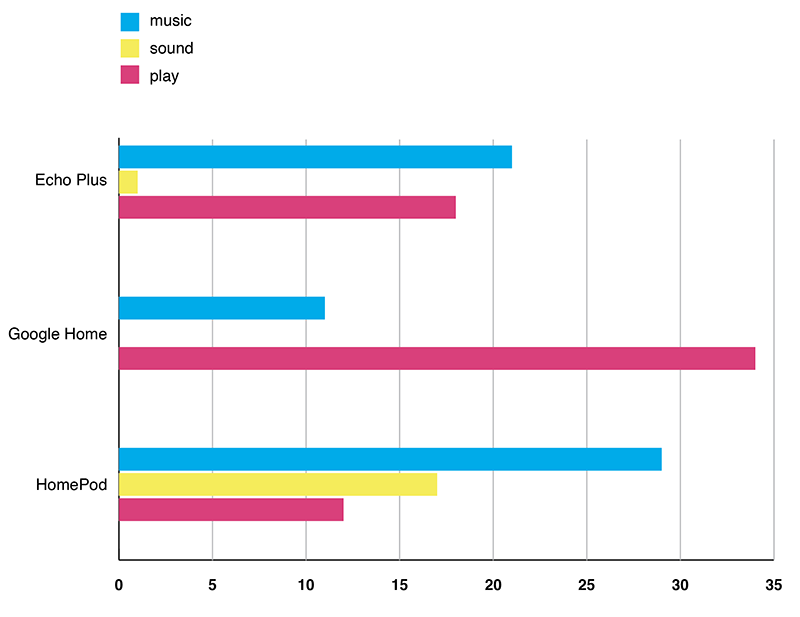
If you want music from your smart speaker, you have to make it happen, so it’s no wonder that the word “play” pops up a lot: 18 times for Echo Plus, 12 for HomePod, and a total of 34 times for Google Home, whose “Google Play” accounts for 6 of those occurrences. But smart speakers offer more than just music, in fact, they can do a whole lot, hence the frequent use of the verb “can.” When asked or when scheduled, smart speakers can deliver. Echo Plus “can” 14 times, Google Home “can” 20 times, and HomePod “can” 14 times. (Digging deeper into the HomePod website and navigating to Do More with Siri on HomePod, “can” appears 16 additional times. Combined with 14 instances at the HomePod Overview, that’s “can” 30 times.)
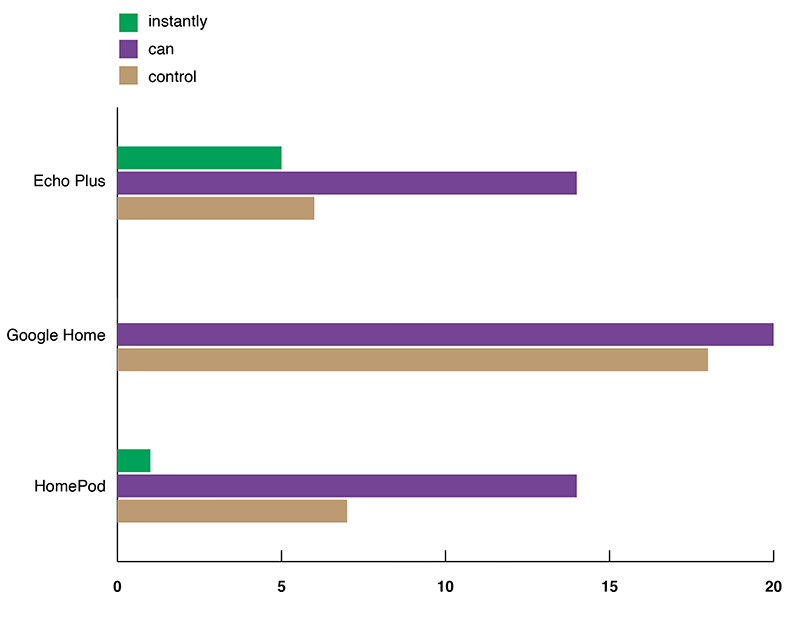
How, precisely, can smart speakers do so much for us? Automatically, daily, weekly, simply, seamlessly. And in most cases, quickly. Echo Plus uses the word “instantly” the most, 5 times. HomePod’s site uses the word once. Google Home? Neither the word “instantly” nor “instant” appear, which is surprising since Google Search in a browser routinely displays how quickly it delivered results—searching for the word “instantly” on Google delivered “about 1,310,000,000 results (0.44 seconds)” but (oddly) none of them appear at Google Home’s learning portal. Speaking of abilities, Echo Plus, Google Home, and HomePod all use the word “control” (or “controlling”) on their respective website to advertise how their smart speakers have power or give you power to direct, manage, get, play, do, make. Google Home uses the word “control” the most, with 18 instances. Service-based words, such as get, listen, and set, are frequently used at Echo’s website—which makes sense, since Amazon is all about order fulfillment.
If brands use the same words or similar phrases to talk about their smart speakers, does that mean that their products all do the same thing? Not necessarily. Reinforcing features, promises, and services, helps the brand and the big idea stick. With repetition in advertising copy, hopefully for brands, we’ll remember them and want to spend money on them. Years before the web took off—and well before smart speakers—Ogilvy touched on these methods in “Radio – the Cinderella medium” in his book Ogilvy on Advertising:
- Identify your brand early in the commercial.
- Identify it often.
- Promise the listener a benefit early in the commercial.
- Repeat it often.
In that same chapter, Ogilvy reminds readers that television swept radio away, a truism when his book was published in the 1980s. But at this moment, radio, print, and the web—along with television—are coexisting, since smart speakers are essentially radios on steroids. Today’s radios listen to us, and we listen to them. It’s just a matter of time until they talk to us “as one human being to another.” And no, that’s not a phrase you’ll find at any smart speaker website. It’s how Ogilvy suggested advertising on the radio should work in the first place, and in my humble opinion, it’s how smart speakers should work too. Until that really, truly, sincerely, instantly happens, and I can talk with Alexa or Siri—or better yet, a reincarnation of The Princess Bride’s Westley—I‘m not going to buy a smart speaker.
